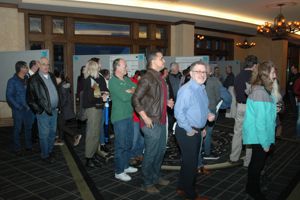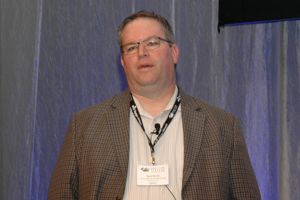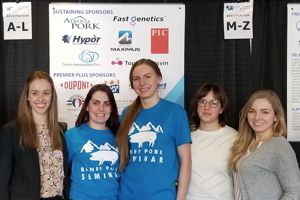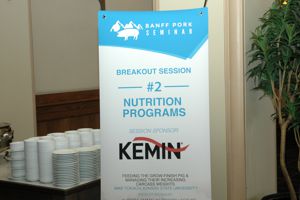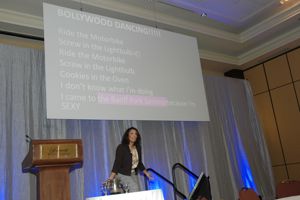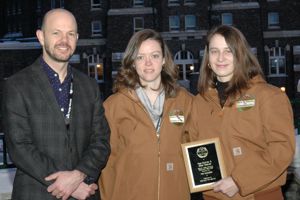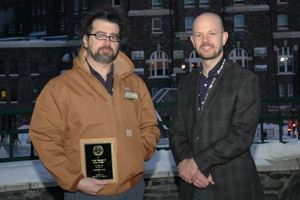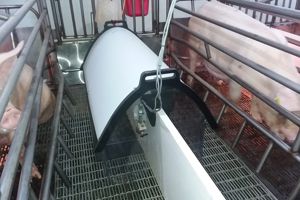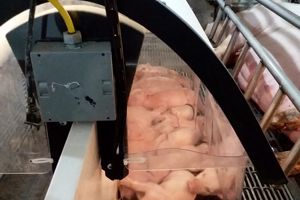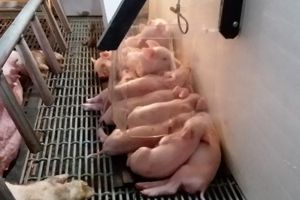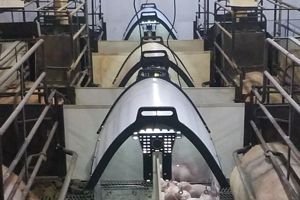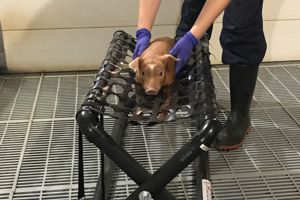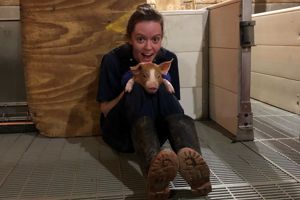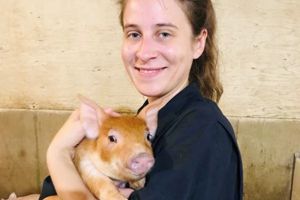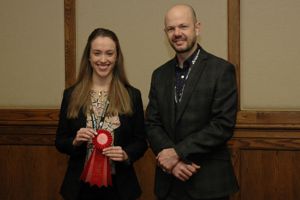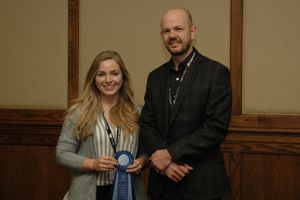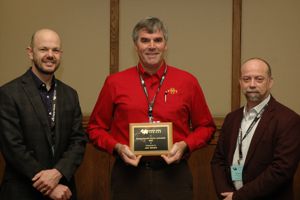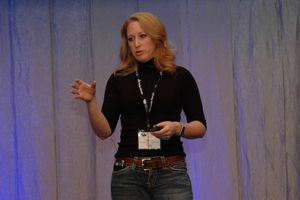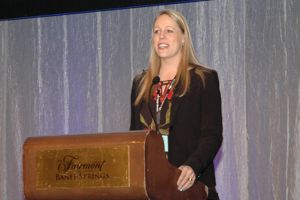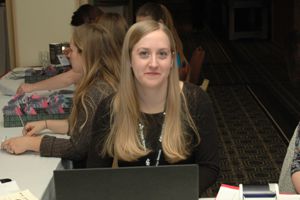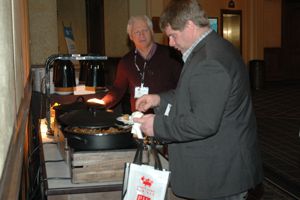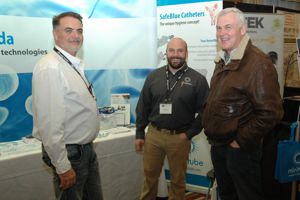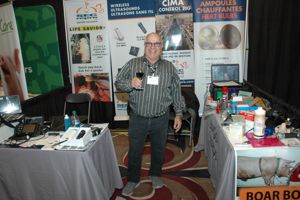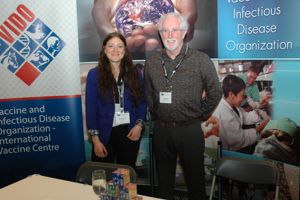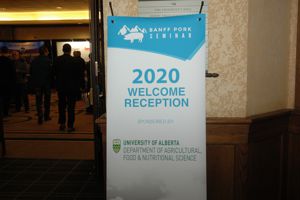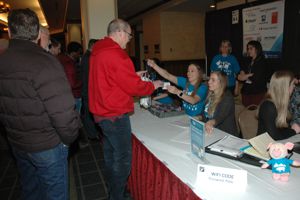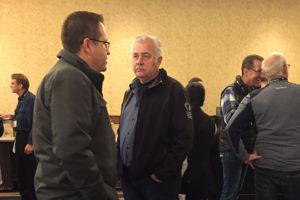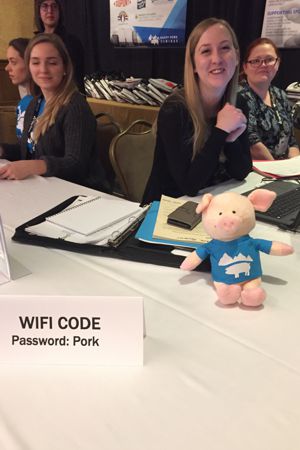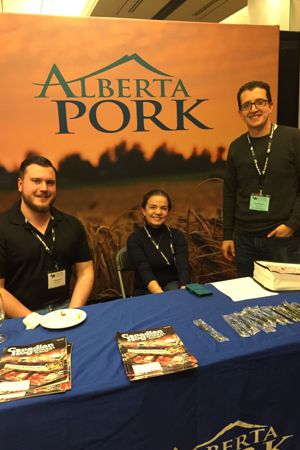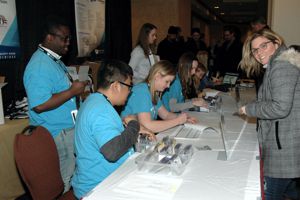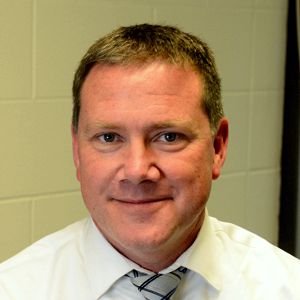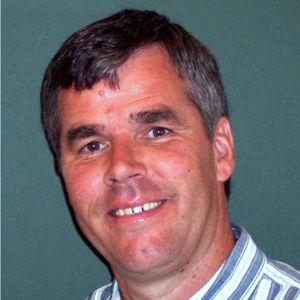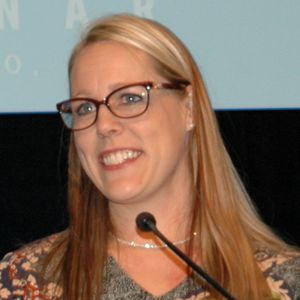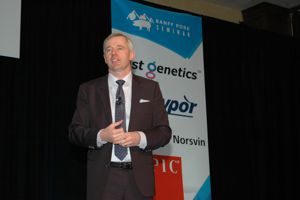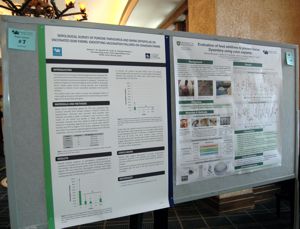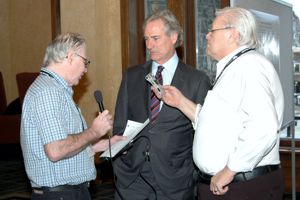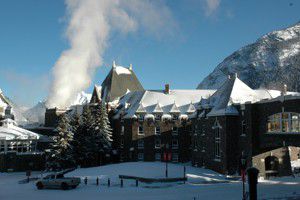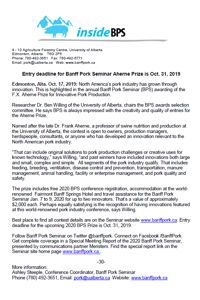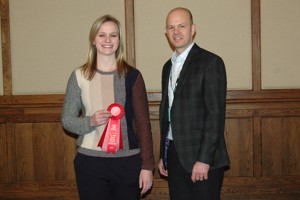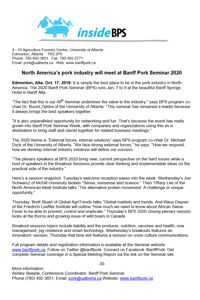Inside BPS Blog
News from the Meristem editors from inside the 2020 Banff Pork Seminar.
- Tell your network what happened at Banff Pork Seminar 2020
- Golden anniversary for Banff Pork Seminar coming Jan. 5 to 7, 2021
- Joe Schwarcz: Insights from a master science communicator
- Time running out to eradicate wild pigs
- Student volunteers helped keep BPS 2020 running
- Banff Pork Seminar proceedings available
- 50 shades of beige: Communicate with the "Cross-Cultural Advantage"
- What we need to know to beat African Swine Fever
- The stories behind the 2020 Banff Pork Seminar Aherne Innovation Prize winners
- Student science winners announced at Banff Pork Seminar 2020
- Jack Dekkers, Iowa State, recipient of 2020 Foxcroft Honorary Lectureship
- Understanding the alternative protein movement
- How to manage trespassing on your farm
- Cronin: Welcome to a new decade and an opportunity for delegates
- BPS 2020 brings industry together to launch a new decade
- Download the BPS 2020 App
- Walk-in registrations are available at BPS 2020
- The annual last minute tips for BPS delegates
- Breakout Session 6: Smart technologies open new doors in pork production
- Get inside the world of vaccines and health at BPS 2020
- Topigs Norsvin returns as 2020 BPS Sustaining Sponsor
- Tapping the full potential of sow longevity
- Follow the search for pig resilience in BPS 2020 Breakout Session 5
- Hypor proud to return as BPS Sustaining Sponsor
- Get the very latest on African Swine Fever at BPS 2020
- Free Pre-conference Seminar at Banff Pork Seminar 2020
- Sustaining Sponsor: Alberta Pork is excited to once again sponsor the Banff Pork Seminar
- Market advisor Brett Stuart tackles trade wars, where to next in pork trade
- Managing for heavy carcass weights, low antibiotics in BPS Breakout Session 2
- Use your power to tell pork's story from BPS with #banffpork
- Tina Varughese brings funny, useful presentation to Breakout Session 9
- Protein alternatives: Challenge or unique opportunity for the pork industry
- Bright young minds, creative innovators at BPS 2020 Breakout Session 8
- Fresh perspective on liability and activism at BPS Breakout Session 1
- The tale of the ticket: How sponsors keep the BPS engine running
- Banff Pork Seminar's 2020 team brings energy, new thinking
- Banff Pork Seminar 2020 welcomes media
- Joe Schwarcz talks "Sense, nonsense and science" at BPS 2020
- Wild ending planned for Banff Pork Seminar 2020
- Book now: BPS hotel rooms moving quickly
- News Release: North America's pork industry meets at Banff Pork Seminar 2020
- Student science abstract deadlines Oct. 31, 2019
- News Release: Entry deadline for Banff Pork Seminar Aherne Prize is Oct. 31, 2019
- Banff Pork Seminar 2020: The search for the leadership edge
Tell your network what happened at Banff Pork Seminar 2020
Date posted: January 10, 2020
Here is a fast way for all 700 plus delegates to get the highlights of Banff Pork Seminar 2020 Jan. 7 to 9 in Banff, Alta. to their entire network.
Close to 750 delegates attended and they will head home with news for the people important to their business and personal world.
News articles and much more from the Seminar are highlighted in the Special Inside BPS Report and are available for use by media, industry information channels and personal use.
A short list of headline examples from news features and blog items available in this web-based report includes:
- Time running out to eradicate wild pigs
- 50 Shades of beige: Communicate with the "Cross Cultural advantage"
- What we need to know to beat African Swine Fever
- The stories behind the 2020 Banff Pork Seminar Aherne winners
- Two winners share 2020 Banff Pork Seminar Innovation Prize
- Understanding the alternative protein movement
- How to manage trespassing on your farm
- North American pork industry will meet at Banff Pork Seminar 2020
You can send your network to the Banff Pork Seminar website for the Special Report link at www.banffpork.ca.
Golden anniversary for Banff Pork Seminar coming Jan. 5 to 7, 2021
Date posted: January 10, 2020
It will a special show. The Banff Pork Seminar (BPS) celebrates its 50th anniversary Jan. 5 to 7, 2021.
BPS co-program chair, Ruurd Zijlstra, closed the 2020 Banff Pork Seminar with an invitation to be back in Banff next year and he added some important message for delegates.
He reminded delegates to fill out their survey forms and challenged them to continue to send their feedback and new ideas any timer. The success of the Seminar depends on them to keep the program fresh.
Zijlstra also encouraged anyone interested in serving on the BPS Advisory Committee to send their names to the BPS office. He thanked those committee members who have served. He also thanked all sponsors for their strong support again this year and reminded delegates that sponsor support means a savings of $250 a person in registration costs this year.
Joe Schwarcz: Insights from a master science communicator
Date posted: January 10, 2020
Sense, nonsense and science.
It was the presentation title listed in the Banff Pork Seminar (BPS) 2020 program, but it is more than that for Joe Schwarcz. It is his life.
Bestselling author of 17 books, radio show host, television spokesperson including appearances on the Discovery Channel many times. His day job is director of McGill University's Office for Science and Society.
Schwarcz told his audiences that he has no conflict of interest to declare in this messaging. "My only allegiance is to the scientific principle. The only thing I and my staff care about it is that decisions are made on science, not emotion or hearsay."
"I and my office deal with this every day, separating sense and nonsense. We are overwhelmed by a tsunami of quackery. It's coming at us from all sides and science is being subjugated by quacks...... As with much of this there is a kernel of truth that gets twisted into something much bigger."
Here is an edited sampling of "Insights from a master science communicator."
......
It is a challenge to separate fact from nonsense. Sometimes it is easy, but it is not always not so simple to make a distinction.
For example, nothing you eat or drink will change your body ph. The body is a buffered system. An example is the alkaline diet so popular currently. It will not make your body more alkaline.
......
Risk and hazard are related but different. Hazard is a rating of a product to do harm. Risk is a measure of the likelihood of that harm occurring. Lots of food has hazardous chemicals in it; what's important is the amount we are exposed to.
Nutritional information is very often flawed. It is often based on surveys which are notoriously unreliable. Most people can't remember what they had for supper yesterday and would certainly have a hard time quantifying it in terms of grams.
......
Diet is complex and confusing. The lunch we had today is composed of hundreds if not thousands of chemicals. One can make a case for the positive or negative aspects of almost any one of these compounds by cherry picking data. You can scare people.
Schwarcz illustrated that with a photo of a plate of fruits and vegetables. Each would be recommended as part of a healthy diet. Yet each one has a hazardous chemical in it. The difference is that level is so small that it is not a risk.
Only the dose makes the poison: One of the cornerstones of science.
......
What should we be eating? Not a simple question. Diet is complex and there is no shortage of information.
Every minute of every day there are roughly five peer reviewed scientific papers released. It is impossible to keep up with even a small sliver of that information. With all that activity it is very easy to make an association between health or harm and some specific product or substance. But that is simply association. There is a very strong association between wearing skirts and breast cancer. But obviously skirts did not cause cancer.
......
One thing research shows clearly. All kinds of studies show that the less we eat the longer we will live.
Nutrition has to be coupled with exercise. Virtually every week there is some new study comes out telling us to exercise. If you really want to stretch out your years exercise and proper diet.
......
There is something else we need to think about. While we sit here and worry about things like the amount of nitrosamine in bacon, every 3.5 seconds someone in the world dies purely for not having enough food. We need to do something to feed the hungry of the world.
Time running out to eradicate wild pigs
Date posted: January 10, 2020
He's part farm boy, a big part researcher with a liberal dose of gunslinger thrown in.
Ryan Brook had a potentially tough role as he closed the 2020 Banff Pork Seminar. He stood between delegates getting an early start on the road home or the evening social time ahead. It didn't take long for him to establish his territory. His pork industry audience sat spellbound.
"More than 700 delegates who came here to talk about managing pigs inside the fence," he told delegates. "I'm the only one who came here to talk pigs outside the fence."
Brook, a University of Saskatchewan wildlife researcher has spent more time than anyone in the country studying the challenge of wild pigs. His message is starkly straightforward. Wild pigs are an ecological disaster. The problem is exploding; people have no idea of how bad and widespread it is. There is nowhere near enough leadership being shown at any level. Time is quickly running out on the ability to eradicate the problem.
Good intentions gone wrong
The feral wild boar problem started back in the 80s when farmers were being encouraged to diversify in a wide variety of ways. The pigs escaped or were released into the wild as the economics of that industry faltered.
Brook uses the term wild pigs because wild boars have crossed or been crossed with domestic pigs. That means larger litter size, bigger animals. Brook and cohorts have seen animals weighing several hundred pounds.
In the wild these animals travel in groups called "sounders" run by a matriarch female who will have control over several generations of offspring. Males travel alone and move across the landscape in search of females to breed. Sounders are increasing in size dramatically.
Wild pigs are incredibly smart and elusive. One reason they are growing is that they are incredibly well fed, he says. Grain storage bags for example are easily accessed.
There are many myths about wild pig control, says Brook, one of the biggest being that populations can be controlled by sport hunting. "We will not barbeque out this problem," he told his audience. "If anything, sport hunting increases the problem. Wild pigs scatter and more groups are formed as a result."
International control effort
Brook's wild pig research efforts are funded in large part by the United States Department of Agriculture with support slowly growing from Canadian partners. But there is no doubt he feels the frustration of a seeming lack of interest from across the landscape in Canada.
He talks openly, warmly and with wry humor about the challenges of that, and speaks like a new sheriff trying to control, to bring common sense to Wild West territory. Judging by the reaction of his audience, he has support for the job.
"A year ago I thought African Swine Fever would have driven a whole new level of renewed interest in the wild pig problem," says Brook "They are an ecological disaster. The habitat damage is huge. They will literally eat anything."
But he adds interest and support has not really increased.
Brook has a checklist of what he sees is needed to make progress on wild pig control.
- Leadership. "There's a real vacuum here and no one is saying let's go kill these pigs. It's a big deal and nobody is getting on board."
- Research and monitoring.
- Judas Pig track and kill control: Capturing a whole sounder, killing all but one, putting a tracking collar and releasing that animal to lead them to other sounders. "It's very effective."
- Whole sounder removal. "Can be nothing less."
- Policy changes regarding land access.
- Disease testing.
- On-farm risk assessment and mitigation. "Do some test cameras as a cheap and easy way to get started."
- Do not support hunting. "You cannot eradicate wild pigs with sport hunting."
- Trapping.
- Get wild boar farms under control.
"No one of these points alone will solve the wild pig problem," says Brook. "It will take a comprehensive plan."
What will it cost asked an audience member?
"Not sure," answered Brook. "Bloody expensive. Hundreds of thousands, maybe millions of dollars. One thing is sure. Ever year you wait it gets more expensive."
Student volunteers helped keep BPS 2020 running
Date posted: January 10, 2020
2020 student volunteers: Julia Linck-Moroni, Josiane Panisson, Mariia Tokareva, Natalie Diether, Theresa Lantz.
When Banff Pork Seminar (BPS) 2020 chair Amy Cronin opened the seminar on Wednesday Jan. 8, she asked students in the room to stand up and be acknowledged. It was a warm feeling as delegates to this seminar see these young people as a big part of the future of the industry.
In fact that student experience has long been a part of the Seminar experience in Banff. Each year a group of them volunteer to help run the front desk activities especially around check-in and to generally be available throughout the seminar. Besides learning, there is no doubt a little enjoyment to be had in the process.
Again this year it all worked smoothly thanks in part to five volunteers Julia Linck-Moroni, Josiane Panisson, Mariia Tokareva, Natalie Diether and Theresa Lantz who were on call throughout the three days.
Banff Pork Seminar proceedings available
Date posted: January 10, 2020
It's the next best thing to being there. If you are not able to attend the 2020 Banff Pork Seminar (BPS) you can get a lot of the information available in a copy of the conference proceedings.
Banff Pork Seminar proceedings are produced each year as the publication "Advances in Pork Production" says Ashley Steeple, BPS conference coordinator. To request copies of the most recent proceedings, or those for previous years (limited quantities available), please complete the Proceedings Request form available online at the BPS website here.
"BPS 2020 proceedings will cost $20 plus shipping. Alternatively, electronic download are also available for $15," says Steeple.
"Scan and email the form to pork@ualberta.ca or fax it to 780-492-5771. For requests for other years BPS will contact you with pricing information for your selection. Or if you prefer just contact the office directly. Payment will be accepted by credit card or cheque."
50 shades of beige: Communicate with the "Cross-Cultural Advantage"
Date posted: January 10, 2020
The pork industry has a frontline view of the changing demographic of Canadian society. It is a globally connected industry these days and in many cases the labor force is made up of people who have moved here from other countries.
That is why Tina Varughese was such a popular speaker choice at the 2020 Banff Pork Seminar. The Indo-Canadian daughter of first generation East Indian parents finds the best of worlds and sheds light, knowledge and most importantly universal humor into the intercultural workplace.
She draws from her experiences as an entrepreneur, mother, daughter, wife, sister and friend when delivering keynotes on work-life balance and diversity and inclusion-topics. She does it with high energy and knowledge gained from 15 years of experience working with immigrants in her roles with the Province of Alberta's immigration office as well as running her own successful relocation and settlement firm.
Why this topic?
Successful organizations understand that being able to communicate cross-culturally in the workplace leads to enhanced productivity, performance and employee engagement, says Varughese. Managing diversity drives profitability, leads to innovation and promotes an inspiring workplace culture.
Within Canada's population, 20 percent are foreign born with the top source immigrant countries being India, China, Pakistan and the Philippines.
Individualists versus collectivists
Individualistic values reflect individual tastes, goals, achievements and accomplishments. Collectivist values reflect common values among families, tribes, work divisions, communities.
Every decision, conversation, and contribution is reflected in this value. The top collectivist countries in the world are Guatemala, Ecuador, Panama, Venezuela, Columbia and Indonesia. The top individualist countries in the world are the United States, Australia, United Kingdom, Netherlands, Hungary and Canada.
What we need to know to beat African Swine Fever
Date posted: January 9, 2020
Twelve years ago, African swine fever (ASF) outside of Africa was a so-called exotic disease with minor impact. That has changed drastically. ASF is one of the most important threats to the global pig-farming sector with no drugs or vaccines are available to cure or prevent the disease.
To prevent, control and eradicate ASF is a big job Klaus Depner of the Friedrich-Loeffler-Institute, told the 2020 Banff Pork Seminar. If we are going to beat this disease the world need to look beyond just biological and include social science, he says.
"Knowledge about disease biology, epidemiology and the human-host interactions is needed. But humans are recognized as the main cause of both long-distance transmission and virus introduction into domestic pig farms," says Depner.
"By considering only the biological particularities of the disease, contagiosity, tenacity and case fatality rate, but ignoring the human aspects, the epidemic will not be controlled. It is crucial to include social science when planning prevention, control, or eradication measures."
Tracking ASF origins
The ASF epidemic started in Georgia in 2007 and subsequently spread throughout the Caucasus and the Russian Federation. In 2014, ASF reached the European Union (EU) and four years later the first outbreaks were reported in Asia. In several European countries the disease has become endemic in the wild boar populations, while it could still be managed in domestic pigs.
When ASF reached the EU, it was expected to either spread rapidly within the wild boar population or fade out due to high case fatality rate and the absence of long-term carriers. The current situation, where the disease has become endemic in several countries, shows that none of these predictions held true. The infection survived locally in the wild boar population independently from outbreaks in domestic pigs.
In addition to local transmission in wild boars, long distance jumps into disease-free areas occurred. Human activities have been identified as main drivers of disease transmission in the domestic pig epidemiological cycle.
The stories behind the 2020 Banff Pork Seminar Aherne Innovation Prize winners
Date posted: January 9, 2020
Ben Willing (left) and winners Gillian Greaves (center) and Tess Faulkner South West Ontario Veterinary Services.
It is always a highlight of the Banff Pork Seminar and this year the response was no different as two well-designed innovations, one from Canada, one from the U.S., shared the honours as winners of the F. X. Aherne Prize for Innovative Pork Production at BPS 2020, Jan. 7 to 9 in Banff, Alta.
Winners for their Hammock Swine Restraint Device were Tess Faulkner and Gillian Greaves of South West Ontario Veterinary Services in Stratford, Ont. Winners for their FarrPro Haven micro-climate for pigs were Amos Petersen and Chris Hansen of FarrPro Inc. in Iowa City, Iowa. The awards were presented by Ben Willing, University of Alberta, chair of the F. X. Aherne Prize committee.
The Hammock restrains the pig to allow both the operator and the animal to relax. Instead of using a sorting board or their body to restrain the animal, animal care staff is able to place the piglet into the restraint, keeping both hands free to safely operate euthanasia devices such as a captive bolt gun, ensuring accurate placement of devices.
FarrPro's Haven unit is a heat and light supplementation platform for use in farrowing crates. It creates draft free microclimate chambers allowing it to deliver highly efficient heat energy to two separate litters. It promotes healthy creep behavior while significantly reducing pre-wean mortality and energy use.
"The Aherne Prize recognizes individuals who have developed either original solutions to pork production challenges or creative uses of known technology," explains Willing. "There is no better place to celebrate industry innovation than the Banff Pork Seminar and we are pleased to acknowledge grassroots inventiveness in the pork industry."
The late Frank Aherne, a professor at the University of Alberta, was a major force for science-based progress in the Canadian pork industry.
Here are the stories behind the two winners edited from their presentation background.
The FarrPro Haven: A Perfect Micro-Climate for Newborn Pigs
The pre-wean mortality rate (PWM) in the swine industry is at unprecedented levels and continues to cause major economic and productivity losses. Iowa based ag tech startup FarrPro has developed novel approach to address this ongoing and costly problem.
FarrPro's patent pending Haven unit is a heat and light supplementation platform for use in farrowing crates. Using the divider wall between neighboring creeps as a base, the Haven creates a draft free microclimate allowing it to deliver highly efficient heat energy to two separate litters. Its elongated, semi-enclosed design provides over 4 cubic feet per creep of controllable and consistent heat energy which promotes healthy creep behavior while significantly reducing pre-wean mortality (PWM) and energy use.
Iowa State University's Agricultural and Biosystems Engineering department recently completed a pilot study of Haven units on a commercial farrowing farm in Ogden, Iowa. The result of that study showed a significant reduction in PWM from 12.04 percent in heat lamp litters compared to 9.67 percent in Haven litters, a 20 percent reduction. With the U.S. average born-alive litter size being approximately 13.5, this translates into 0.32 more pigs weaned per litter. The study also showed that Haven units used an average of 3.25 kWh per day compared to the heat lamp average of 6 kWh per day, a 46 percent reduction in energy use.
Scott Dorr, farrowing manager for the Ogden, Iowa producer where Iowa State conducted the study, has this to say about the Haven units.
"With over 30 years in the hog business I've never seen pigs lay as comfortably as they do under the Haven. They're warm, relaxed, and there's no piling. But what's really amazing is how well they spread out along the divider wall between stalls which reduces the chance they will be laid on. Because of this, the Haven significantly reduced our overall pre-wean mortality rate when compared to heat lamps and also used 46 percent less energy to operate so they are helping us deliver more healthy pigs to the nursery while lowering our energy costs. That's a win-win for us."
In July of 2019, FarrPro's Haven was selected by a panel of industry experts as one of the swine industry's top new products in the 2019 National Hog Farmer New Product Tour and also won the National Hog Farmer's "Producer's Choice" Award.
The Hammock restraint device improves animal care and handling
As young professionals starting out in the swine industry, we were quickly immersed in on-farm production as well in on farm trials in conventional swine facilities. These environments often accommodate the typical farmer, someone who is strong and has years of experience handling pigs.
In contrast, we entered this field, with less experience, so we found that there was a need to create something to help in our daily working lives when it came to having to restrain pigs. Although nursery pigs are small, when you are learning new techniques, especially ones that have to do with euthanasia, it can be difficult to restrain them comfortably.
One thing that we had to do in our research trials as well as when helping production clients was euthanize piglets in nursery settings. Although a producer may find this task simple enough, our physical ability and lesser experience led us to try and find a new way to complete the same task. So we developed the Hammock.
Our research and production team is made up largely of newcomers to the swine industry and we were able to use our tool in helping with euthanasia training of new staff members, as well as with producers who, although experienced, also expressed difficulty when having to handle pigs and euthanize.
Depending on the size or fitness of the animal, as well as the size or fitness of the personnel who had to complete the euthanasia, the process could become quite difficult, causing unnecessary stress to both the animal and the human handler.
Better restraint
The Hammock acts to restrain the pig in a manner that allows both the operator and the animal to relax. Instead of using a sorting board or their body to restrain the animal, animal care staff is able to place the piglet into the restraint, keeping both hands free to safely operate euthanasia devices such as a captive bolt gun, ensuring accurate placement of devices.
In addition to increased human safety, the Hammock relieves the pressure placed onto the pig with traditional restraint methods, decreasing the amount of stress that the animal is placed under in restraining practices associated with euthanasia.
Device specifications
The Hammock was designed to be practical - easily compactable, folding down to be stored and used in a barn setting. A number of variations were constructed and tested in a barn setting with both research staff and producers. The latest design has improvements in strength, collapsibility, ease of cleaning, as well as the ability to use with pigs of various sizes (from 5kg to 25kg).
In addition, this design can be easily built by producers for a minimal cost using items found at a local hardware store.
Student science winners announced at Banff Pork Seminar 2020
Date posted: January 9, 2020
Two young scientists at the 2020 Banff Pork Seminar (BPS) Jan. 7 to 9, in Banff, Alta. were presented with the R. O. Ball Young Scientist Award.
The award recognizes graduate students who provide a best overall combination of good and relevant science, well-written abstract and excellent presentation. It is named after Dr. Ron Ball, a former BPS program director and long-time researcher.
First prize was awarded to Julia Linck Moroni, University of Alberta. Her paper was titled "Influence of litter weight birth phenotype on embryonic and placental development."
Second prize went to Theresa Lantz of the University of Alberta for her paper "Use of near-infrared spectroscopy as an inexpensive, fast and non-destructive method for intramuscular fat analysis in pork chops."
First place winner receives a $500 cheque and plaque and second place receives a $250 cheque. Awards were presented by Ben Willing, chair of the BPS award committee.
Jack Dekkers, Iowa State, recipient of 2020 Foxcroft Honorary Lectureship
Date posted: January 8, 2020
Resilience is a word pork producers understand clearly on the business side. These days it is becoming a much more important production factor in the barn.
As we reduce antibiotic use it is increasingly important to identify and support disease resilience. Resilience is defined as the ability to maintain performance in the face of pathogen exposure.
There are many aspects of resilience research and Banff Pork Seminar (BPS) Breakout Session 5 brought together four leading speakers on this topic. One of those was the George Foxcroft Lectureship for 2020, Jack Dekkers of Iowa State University.
"This award allows the Banff Pork Seminar, working in conjunction with the University of Alberta, to host speakers who are conducting leading research that is applicable to the pork production industry and will potentially improve production efficiency.
"The quality of the research and contribution to the pork industry are the determining factors in selecting a recipient for this award," says Willing. "Jack Dekkers is a clear example of that success."
Dekkers grew up in the Netherlands and received B.Sc. and M.Sc. degrees from the Wageningen Agricultural University and a Ph.D. from the University of Wisconsin in Animal Breeding. From 1989 to 1997 he was on faculty at the University of Guelph, working closely with the Canadian industry on genetic improvement of dairy cattle.
He currently is a C.F. Curtiss Distinguished Professor and Leader of the Animal Breeding and Genetics group at Iowa State. Current research focuses on the genetic basis of feed efficiency and health in pigs and on the integration of quantitative and molecular genetics, including whole genome selection, with applications to swine and poultry.
Dekkers' BPS presentation was entitled "Genetics and early predictors of resilience." He was joined in Breakout Session 5 by John Harding of the University of Saskatchewan who spoke on "The Natural Disease Challenge Model (NDCM) for evaluating resilience." Ben Willing of the University of Alberta added his presentation "Finding the microbiome to support resilience." And Bob Kemp of Genesus spoke on "Genomics and Disease Resilience: Next Steps?"
Understanding the alternative protein movement
Date posted: January 8, 2020
First there were veggie burgers. Then came Better Burgers, Impossible Burgers, Beyond Burgers and more. Tiffany Lee, Director of Regulatory and Scientific Affairs for the North American Meat Institute shared her inside perspective on the alternative protein movement currently catching consumers' attention with delegates to the 2020 Banff Pork Seminar in Banff, Alta.
"Alternative proteins are divided into two types. Plant-based and cultured, or cell-based proteins," says Lee. "I prefer the term cultured because all living materials are made of cells."
The plant based alternatives appeared many years ago and were foods geared towards those who didn't want to eat meat but wanted something that would fit with the menu of the rest of the family. The tofu and veggie burgers of early years have evolved over the years into a whole class of more sophisticated products available broadly in retail and restaurants.
These are made in a number of ways but generally vegetables, including soybeans, carrots, celery, peas, mushrooms, among others, are combined with oil, and other ingredients such as nuts, potato flakes, or flour are used to create the burger patty. These products do not attempt to mimic the taste or texture of meat, but provide a plant-based alternative to those who follow a vegetarian diet.
"Recently, a few food-production companies set out to target more omnivorous consumers by improving the sensory qualities of plant-based proteins, especially imitation burgers. Several methods for improving the taste, smell, and texture of plant-based proteins are being used," says Lee.
A few of these companies are focused on trying to recreate the eating experience of beef: using things like beet juice to mimic the blood in real hamburgers; or heme, an iron-containing molecule that carries oxygen in animals and plants. Leghemoglobins responsible for nitrogen fixation in plant species are very similar to hemoglobins in animal tissue (which give it is characteristic meaty taste) and can be used to produce heme in plant-based burgers. One company is producing heme via genetic modification.
Perhaps the newest and most challenging territory for this industry and the meat industry is cultured protein. This practice involves what many have loosely described as laboratory produced protein. It involves in vitro muscle cell production which requires fetal bovine serum for the complex process. This is expensive, difficult to obtain in adequate quantities and would raise issues with any opposed to animal slaughter. As well, the process must also produce fat cells, which are different from muscle but are essential for the proper flavour and textures of meat products.
Cultured meat will have unique challenges to marketing and production compared to plant based protein, says Lee.
Level playing field
It is easy to see the lines are becoming blurred between what is plant and what is animal for consumers, Lee says. While a few of these products are already on the market, others have a way to go before becoming an affordable, easily accessible meat alternative.
As well, the few life cycle assessments completed of these products - used to determine their impact on things like climate change and human health - have yielded a wide range of results that position "fake meat" as either significantly better or significantly worse when compared to animal protein.
That leaves consumers more confused as ever.
The critical issue for the meat producing sector according to Lee is finding a way to ensure these products are all competing on equal terms, especially when marketing to consumers. In the United States there are different regulating bodies that oversee different areas of the food supply. Getting them to collaborate on what can and cannot be called meat, what claims can be made and where it can be sold are all issues in the process of being resolved.
Lee says "As the meat industry we are simply asking for a level playing field. That will be critical to ensuring consumers understand what they are buying and to ensure these products are competing on the same criteria as animal-based proteins."
To have common food safety criteria or to call something greener, cleaner or healthier will require significant research and scientific discussion, Lee says. "Healthy competition makes us all better. But we would like to see the same rules in place for everyone and then we can let the market decide."
How to manage trespassing on your farm
Date posted: January 8, 2020
The past year has brought several examples of activists trespassing on farm land to create media exposure around farming practices. It's a situation expected to continue.
As president of the industry advisory service Ag & Food Exchange Ltd., Geraldine Auston provides issues management expertise for businesses pressured by existing and emerging tactics affecting animal use and related production practices in Canada.
She brought her expertise and ideas for farmers and other industry players facing the challenges of trespassing to the 2020 Banff Pork Seminar, Jan. 7 to 9 in Banff, Alta. Here's a recap of her key recommendations.
Being Prepared
With the rising incidence of farm trespass, it is important that you take steps to protect your families, animals and properties, says Auston.
All farms should take steps to secure their properties and implement any improvements to existing security and biosecurity plans. If you wish to reach out to your local law enforcement detachment to discuss trespass and how they would respond, that may be useful.
Your conduct in the event of a trespass
- How you handle yourself with trespassers is critical.
- Do not engage in any way, other than to inform them that they are trespassing and to leave your property. Inform them that the police have been called.
- Do not use force when dealing with trespassers.
- Do not leave trespassers in a barn alone, and do not stay in a barn alone with them.
- Capture your own evidence on your phone.
- Police will respond to your 911 call as soon as possible. Note that 911 responses are dealt with on a priority basis. If there is an accident or a more serious crime in progress, it may take longer for law enforcement to attend your farm. Be patient and continue to monitor trespassers until police are at your site.
Revisit security, biosecurity protocols
It may be time to revisit and rethink the protocols in place for your property, says Auston.
- Talk to your family, employees and any service providers about being mindful of security.
- Be aware of any unusual activity around your property/region; engage your family and employees to be aware too.
- Ensure you have adequate door locks to discourage break-ins.
- Make sure all buildings are locked at all times including when you are working in barns.
- Gates at property access should be closed when not in use, closed and locked overnight.
- Ensure private property is obvious. Have signage and other identifiers (fences, gates, chains, etc.).
- Use "No Trespassing" signs.
- On a large property, with multiple access points, ensure all are marked with signage and gates (if possible).
- Use lighting around all buildings at night. Make sure the lighting is bright enough to discourage trespassers from surveying your property and leaves no dark areas to hide.
- If you have alarms, use them.
- If you have closed-circuit television (CCTV) make sure it is installed in such a way to collect the most valuable information/images from around your property. Ensure CCTV is not aimed to collect images from public areas. If you have CCTV you must have signage that advises people they are being recorded. Check your CCTV footage regularly to ensure there is no suspicious activity captured on it.
- If suspicious activity is identified in and around your property record the details and report to your industry association and police (non-emergency line). Valuable information to collect is description of person, description of vehicle, date and time and why the activity is deemed suspicious. Collecting as much information as possible is important. Use your phone to capture images if you are able.
Preparing for a mass trespass invasion
If you are a target of active trespassing and/or break and enter you need to act with urgency, says Auston. Call 911 immediately, do not delay. Make sure it is clear that something is happening 'right now'.
Ensure that the call taker has the correct details (trespass, break and enter, refusing to leave, any aggressive behavior) and is aware that you feel threatened and are concerned for your safety and the safety of your animals.
Be prepared to provide:
- Location
- What is occurring and why (protestors/activists, risk to people/animals, any threats, preventing work, any property damage, etc.)
- What is being said, what is on signage, if they are using loudspeakers, etc.
- Number of people, descriptions of individuals, vehicles, and license plates.
Cronin: Welcome to a new decade and an opportunity for delegates
Date posted: January 8, 2020
Banff Pork Seminar chair Amy Cronin was feeling the symbolism of a new decade as she welcomed more than 700 delegates to the 2020 seminar in Banff, Alta. This year`s seminar has a carefully thought out theme, she told the group. It`s "External Forces, Internal Solutions."
She introduced and thanked her organizing committee, made special note of thanks for conference coordinator Ashley Steeple. And she thanked sponsors: Without you, this conference would not be possible. Then she did a quick survey of the people in the room that had some surprises for many people.
"Every year there is a buzz at the conference," says Cronin. "Let's get an idea of who is in the crowd with us today. By the end of this, everyone should have been standing at least once."
One by one sponsors, farmers, agribusiness, academia students, international guests, Western Canada and Eastern Canada stood up. The buzz in the room was the surprising number of people in various categories.
This year, the Seminar continues to draw incredible speakers from around the world, Cronin reminded her audience. It`s an opportunity to learn about new production research and innovation, smart technology, sow management, nutrition, gut health, and a few new ideas that reflect the times, such as the threat of African Swine fever - thinking through the unthinkable, and liability and the producer.
"This is my final year on the BPS committee," she says. "It has been an honour to be involved as an advisory member for the BPS for the past four years and as chair of this conference for the past two years. This industry is one that holds a special place in my heart. Mike and I have been involved in it for 24 years and will be for many, many more.
"I'm thankful for a conference as sophisticated as the Banff Pork Seminar to bring people together for fun, fellowship and learning. I encourage each of you to keep an open mind over the next couple of days. There may be things that concern you, that worry you, that anger or frustrate you, but hearing them, and giving them thought and consideration, will broaden your horizons.
"My hope is that you will be inspired to take two or three ideas back to your farm, your business, and your studies that will make your operation better in 2020.
"Enjoy the Banff Pork Seminar."
BPS 2020 brings industry together to launch a new decade
Date posted: January 8, 2020
It is the first meeting of the year for the more than 700 delegates attending Banff Pork Seminar (BPS) and it launches a new decade in the pork industry and the agricultural world.
As the first delegates wind their way through registration lines, BPS conference coordinator Ashley Steeple is confident that the 2020 experience will be a good one for those early birds and the rest on their way.
Beautiful is a term used often to describe the Banff Springs Hotel. This year with mountains covered in a thick blanket of near record fresh snow as a backdrop, the grand hotel will inspire a new group arriving for this meeting.
Steeple sees it from the inside of this big event. She and the organizing committee emphasize how pleased they are to work with the hotel to make the entire meeting experience match those expectations.
"One reason we signed on here with the Banff Springs is that the meeting rooms and social areas are arranged in such a convenient format," she says.
Watching delegates network through the opening social event she says she is reminded that networking and personal time are a big part of the reason people attend this seminar. With many social options available right in the hotel making it is easy for people to find that personal time.
She reminds all delegates that the organizing committee looks forward to feedback throughout the seminar about any aspect of the event.
"Filling out seminar evaluations is particularly important," she says.
Delegates enjoy opening reception
Download the BPS 2020 App
Date posted: January 2, 2020

Here's something that will improve your experience at Banff Pork Seminar 2020. Best of all it's free and easy.
Use the Banff Pork Seminar App to optimize your conference experience and make the most of BPS 2020.
You can view the agenda, find your sessions, read speaker biographies and abstracts and even find your way using the integrated floor-maps. You can also chat with fellow delegates, network with exhibitors and sponsors, stay up-to-date with conference announcements and so much more.
Search the App store for the "Crowd Compass AttendeeHub App" Download then search events for Banff Pork. You can reach the app store on mobile devices at this link or from a desktop by this link.
Enjoy the seminar.
Walk-in registrations are available at BPS 2020
Date posted: January 2, 2020
Anyone who decides at the last minute to go to the 2020 Banff Pork Seminar, Jan. 7 to 9, can still attend. Conference Coordinator Ashley Steeple says walks-in registrations will be accepted in Banff.
"Please use the online registration link at the website www.banffpork.ca to provide us with all the necessary details, because that really speeds up the process when you arrive," says Steeple. "That link will be available until Thursday morning of the Seminar.
"When you show up at the Seminar go directly to the registration desk and the team there will get you registered."
The annual last minute tips for BPS delegates
Date posted: December 23, 2019
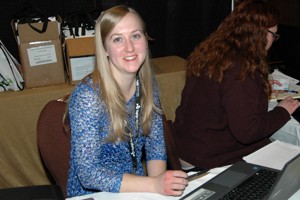
Ashley Steeple
If you are heading for Banff Pork Seminar (BPS) 2020 here's a quick last-minute checklist for delegates that Seminar coordinator Ashley Steeple provides each year.
The venue. The Banff Springs Hotel is a special place for BPS and delegates. It's where the Seminar began more than 45 years ago. There are several restaurants and lounges right in the hotel so check out which best fit your needs. Don't want to wait? Make your reservation ahead of time at www.fairmont.com/banff-springs/dining. BPS delegates receives a 10 percent discount on dinners at all Fairmont Banff Springs Restaurants Jan. 6 to 9.
Registration payment. If BPS has not received payment for your registration or your group's registration, delegates will not be able to check in and pick up their kits until payment is received. Please ensure the first person to check in from your group is prepared to settle the invoice. Payment by credit card, cheque or cash is accepted.
Breakout sessions. The breakout sessions delegates have selected are printed on their name tags. If you did not choose sessions, the person who registered your group may have chosen for you.
Note that breakout sessions have limited seating and once a session is full, fire regulations prevent BPS from allowing more people in. Please arrive at least five minutes before the session to avoid disrupting speakers and other delegates and to ensure you get to see sessions you want.
Wednesday evening is open. There is no formal event planned for Wednesday evening. Delegates can meet after the day's breakout sessions and enjoy a refreshment from the cash bar in the tradeshow area, then head out on their own to enjoy the best of Banff.
Wear your nametag. Name badges will be required for entry into sessions, functions and meals.
Free wireless. There is free Wi-Fi in the hotel and meeting rooms. Password is "pork".
Check the BPS app. It will have all the program details delegates need for quick, easy access to program details such as breakout locations. App download details will be sent to each delegate.
Banff Airporter Shuttle discount. Anyone arriving by air and wishing to book on the Banff Airporter Shuttle can get a fifteen percent discount by booking online. Check under the Hotel and Travel button, Airport and Shuttle tab for booking link, promo code and details.
Free downtown shuttles. These will be running between downtown and the Banff Springs during the evening. See the program or the conference app for times and pickup locations.
Find the latest news at the Inside BPS 2020 Special Report. Get news, photos and the Inside BPS blog in this Special Meeting Report from the 2020 Banff Pork Seminar, presented by communications partner Meristem. Find the special report link on the BPS website home page. Inside BPS Report articles are available with credit for reprint for individual, industry or media use.
Follow BPS on Twitter. Follow us @BanffPork or with the #BanffPork hashtag for the latest news and highlights during the conference.
Final program handout. A PDF of the 2020 program handout with final details will be on the BPS website www.banffpork.ca in late December. Click on the Program button at the Home page, then on the printable Program PDF tab.
Seminar evaluations. These are critically important to planning future seminars so please fill them out.
The BPS team looks forward to meeting you in Banff.
Breakout Session 6: Smart technologies open new doors in pork production
Precision agriculture is growing across the entire farming spectrum and the pork industry is right in the mix with new developments. These "smart technologies" will be featured in Breakout Session 6 at Banff Pork Seminar (BPS) 2020.
"All of agriculture is seeing a move to precision farming where we can use technologies to gather more and different types of data," says Michael Dyck, program co-chair for BPS 2020. "We are seeing real advances in crop management and the dairy industry is a good example gathering information on individual animals and then determining how best to address management or select animals for a production environment.
"We have invited three people on the frontlines of smart technologies in pork production to BPS 2020 to look at that opportunity from several perspectives."
Dale Polson of Boehringer Ingelheim Animal Health will look at "Production livestock ecosystems: Integrating technology, process and culture." That will cover finding the characteristics of a system that needs to be addressed to integrate smart technologies.
University of Nebraska research has looked at systems to track individual animals. Benny Mote of the University speaks on how individual pig tracking in group housed swine offers a deeper understanding of swine production.
Finally related to this is the growing industry of apps, says Dyck. "There are more apps to collect this type of data so at BPS we will have discussion around the apps available and the types of applications for their systems."
Chris Bomgaars of EveryPig Inc. looks at "EveryPig: A better way to manage pig health."
Full BPS program information available at www.banffpork.ca.
Get inside the world of vaccines and health at BPS 2020
Date posted: December 16, 2019
When a disease threatens livestock one common question is why aren't we able to develop a vaccine for that?
"Pork producers faced with African Swine Fever or PED want to know what it takes to get an effective vaccine to help deal with the problem," says Michael Dyck, program co-chair for Banff Pork Seminar (BPS) 2020.
"The key term is effective because we want something that works all of the time."
Breakout Session 3 at BPS 2020 takes us inside that rapidly evolving vaccine world with a useful look at the industry side and on-farm advice, says Dyck.
Volker Gerdts of VIDO-InterVac looks at "Novel advances in vaccine development." He will recap for the audience what vaccines are, the different types that exist and what it takes to develop them depending on the type of disease.
Then Jessica Law of Prairie Swine Health Services looks at the more practical side of the issue with her presentation "Vaccines in practice: Understanding and optimizing your vaccines." What are the things to consider to have an effective vaccine program on-farm.
Full BPS program information is available at www.banffpork.ca.
Topigs Norsvin returns as 2020 BPS Sustaining Sponsor
Date posted: December 16, 2019
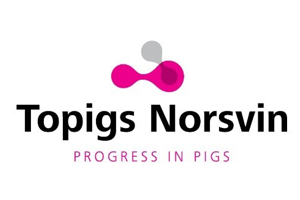
Topigs Norsvin is one of the largest swine genetic suppliers in the world. Each year the company produces over 1.8 million crossbred gilts and more than 11 million doses of semen, while slaughter houses receive over 118 million pigs that are produced using Topigs Norsvin Genetics. The genetic lines that Topigs Norsvin Canada produces include the Maternal lines: Topigs 20 and TN70, the Terminal Sire lines: Norsvin Duroc, TN Talent and TN Tempo and the pure lines: Norsvin Landrace, N-line and Z-line.
Topigs Norsvin is renowned for implementing new technologies and focusing on cost-efficient pig production. The company revolves around three pillars: research, innovation and dissemination of genetic improvement.
To improve genetics, Topigs Norsvin utilizes a unique breeding program which focuses on four main areas to cover the entire value chain: 1) Feed efficiency 2) Robustness and welfare 3) Carcass & Meat Quality 4) Reproduction. To ensure these four areas of the breeding program are successful many steps are taken such as a great amount of phenotyping, CT scanning of boars, global nucleus breeding, genomic selection and data collection. Through the improvement of genetics, pig producers notice an improvement in cost efficiency while consumers notice an improvement in meat quality.
Tapping the full potential of sow longevity
Date posted: December 11, 2019
There is not much argument that sow productivity has dramatically improved in recent years. But one of the casualties of that improvement is sow longevity.
"Sow longevity relates to how many sows are actually remaining in the herd and for how long," says Michael Dyck, program co-chair for Banff Pork Seminar (BPS) 2020. "We put a lot of pressure on the breeding herd to produce more pigs per sow per year, including selecting animals that are able to accomplish that. But in some ways those sows are sacrificing themselves.
"This has been a topic at Banff Pork Seminar (BPS) in past years and for 2020 we are bringing in two highly qualified speakers to talk the latest developments in Breakout Session 4," he says.
Dan Bussières of Groupe Cérès, a Quebec-based swine production consulting company will look at "Key aspects for capturing reproductive and sow lifetime productivity."
And North American industry veteran Bob Thompson will address the challenges of what is causing sow mortality and how can some of those issues be mitigated.
"Practical information of direct interest to pork producers," says Dyck.
Complete BPS program information is available at www.banffpork.ca.
Follow the search for pig resilience in BPS 2020 Breakout Session 5
Date posted: December 11, 2019
How do we make pigs more resilient? It is a goal of more research in today's high performance production era.
"We're not talking about resistance, the ability to the animal to fend off disease," says Michael Dyck, program co-chair for Banff Pork Seminar (BPS) 2020. "Resilience is when animals not only have the appropriate immune response to the challenge but they will keep performing, keep eating, keep growing all the things they need to do to be productive in the herd.
"There is a fair bit of research done as to what factors are related to resilience," he says, "things like genetic markers and the microbiome. We know the gut microbiome is related to overall health. Is there a certain gut profile of bacteria that are more likely to part of an animal that is more resilient and less susceptible to disease?
"How can we manage all these things? Research is looking to develop a disease challenge model to assess animal response to disease. Then what are some of the factors that define an animal resilience be it genetic or behavioral characteristics to microbiome characteristics."
Four speakers tackle this whole area in an extensive discussion in Breakout Session 5, says Dyck.
John Harding of the University of Saskatchewan looks at "The Natural Disease Challenge Model (NDCM) for evaluating resilience." Jack Dekkers of Iowa State talks "Genetics and early predictors of resilience." Ben Willing of the University of Alberta talks "Finding the microbiome to support resilience." And Bob Kemp of Genesus talks "Genomics and Disease Resilience: Next Steps?"
Hypor proud to return as BPS Sustaining Sponsor
Date posted: December 11, 2019
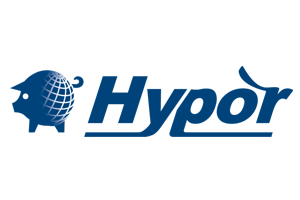
The Banff Pork Seminar is one of our favourite events of the year. It's a great chance to connect with important members of the industry and stay up to date with all things 'pigs', all while enjoying the beautiful mountain backdrop. We're proud to be a Sustaining Sponsor for this year's seminar.
Supplying high quality genetics and technical support requires a close connection to the needs of the industry, throughout Canada and the rest of the world. We combine advanced breeding technology with market expertise for a balanced breeding approach. This maximizes the bottom line, rather than performance in a single trait or phase. Hypor is a part of Hendrix Genetics, a global leader in multi-species breeding and genetics.
Our team of experts will be circulating throughout the sessions, and we will be present in the Exhibitor Hall. Come say hello! We welcome any opportunity to hear how we can help you maximize performance and enhance success. To learn more about our products and services, visit www.hypor.com.
We wish you an enjoyable and educational time at the Banff Pork Seminar!
Get the very latest on African Swine Fever at BPS 2020
Date posted: December 1, 2019
It's a disease on the top of minds of pork producers around the world, but especially for Canada which so far has managed to keep out. The industry is preparing in case the borders are breached.
Banff Pork Seminar (BPS) 2020 has an excellent overview for all producers and industry players of the state of the union on African Swine Fever, says Ruurd Zijlstra, program co-chair.
"We know that major outbreaks of African Swine Fever ASF are now happening in China and the rest of East Asia, The Philippines, Viet Nam and other countries in that area," says Zijlstra. "But in Eastern Europe the disease has been going on for some time."
The Thursday morning Plenary features speaker Klaus Depner from Friedrich Loeffler Institute in Germany who will give a European perspective on control and eradication there. That includes one of the major challenges in that part of the world, a very large wild boar population.
Then Breakout Session 7 features three speakers who will get down to specifics, what producers need to think about when foreign animal disease is happening on farm.
Amy Cronin, producer and representative of Swine Health Ontario talks "Thinking through the unthinkable," key action items and how producers should be prepared.
One issue is major loss of revenue. Alex Dejong of BMO Financial looks at "Financial planning for a foreign disease outbreak."
Then veterinarian and industry leader Egan Brockhoff of Prairie Swine Health Services looks at "How we ensure business continuity through prevention, preparedness, response and recovery."
"The big one is prevention," says Zijlstra. "We need to make sure we are very resilient on biosecurity protocols. But as a follow-up on the excellent presentation he gave on the topic last year, Egan will also go into the industry as a whole, look at what can we do as a country, as a Canadian and North American pork industry to keep this disease out."
Free Pre-conference Seminar at Banff Pork Seminar 2020
Date posted: December 1, 2019
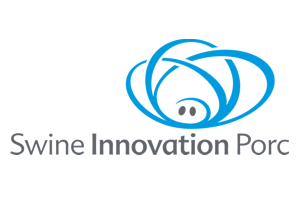
Banff Pork Seminar (BPS) coordinator Ashley Steeple reminds all delegates attending BPS 2020, Jan. 7 to 9 that they have a chance to arrive a little early and take in a free pre-conference seminar.
Hosted by Swine Innovation Porc the afternoon seminar is slated for Tuesday, Jan. 7 from 2:00 p.m. to 4:00 p.m. in the Alhambra Room at the Banff Springs Hotel.
The topic is "What is the microbiome anyway? Gut health and how it impacts pig production."
Three speakers will cover the topic from various angles. "The gut microbiome and why you should care about it," will be tackled by Emma Allen-Vercoe, University of Guelph. Then John Harding, University of Saskatchewan will cover an "Overview of pig gut health challenges from birth to market.
Andrew Van Kessel, University of Saskatchewan closes with his presentation "The future of pig gut health: Research to come."
"This is the third year for this pre-conference seminar," says Steeple. "It is an example of how Banff Pork Seminar provides an opportunity for companies and organizations to create value added opportunities around the main Seminar program throughout the entire week."
More information on the pre-conference seminar is available here. To register for the event email .
Sustaining Sponsor: Alberta Pork is excited to once again sponsor the Banff Pork Seminar
Date posted: December 1, 2019
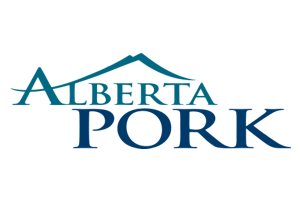
We are a non-profit organization representing the province's more than 800 registered hog producers before government, industry partners, media, the general public and other interest groups.
This year, we are celebrating our 50th anniversary. Our producers' tireless efforts have been the driving force behind the pork industry for half a century, and a debt of gratitude is owed to those responsible for this accomplishment.
We would also like to recognize the many processors, researchers, veterinarians, transporters, retailers and everyone who supports the entire pork value chain. Because of you, Albertans, Canadians and consumers around the world have been privileged to enjoy the highest-quality, best-tasting pork ever produced.
We hope you enjoy the 2020 Banff Pork Seminar!
Market advisor Brett Stuart tackles trade wars, where to next in pork trade
Date posted: November 25, 2019
Few topics in the agricultural industry this past year have been bigger than trade.
The Banff Pork Seminar (BPS) Thursday plenary has a speaker, Brett Stuart, who can explain what has happened and will give a peek into what may be coming in the next 12 months.
"It is almost unfathomable how much things have changed in last 12 months," says Ruurd Zijlstra, program co-chair for BPS 2020. "And who knows what will change in the next couple of months before Banff Pork Seminar 2020.
"When we came up with this topic we could not have predicted what would happen with trade. The most recent thing is China has re-opened the market for Canadian pork. That is good, but there are a lot of the implications of markets being open and shut down for the last year and questions about what the next 12 months look like for opportunities for Canadian pork producers."
BPS 2020 is a good place to get the story behind the issues in trade, says Zijlstra. Brett Stuart has been to BPS before and he is an excellent speaker. His company, Global AgriTrends, provides market research and analysis to a variety of clients around the world.
Managing for heavy carcass weights, low antibiotics in BPS Breakout Session 2
Date posted: November 25, 2019
Producers usually select Banff Pork Seminar (BPS) breakout sessions based on the practical value of the information provided.
It does not get much more bottom line than nutrition and the topics two speakers will address in Breakout Session No. 2, says Ruurd Zijlstra, BPS program co-chair.
Michael Tokach of Kansas State University looks at feeding grow-finish pigs and managing carcass weights.
"Packing plants have been aiming for heavier and heavier pigs, a move that has to do with internal efficiencies," says Zijlstra. "That has put a lot of pressure on pork producers to get pigs to the new ideal carcass weights and carcass quality.
"This session will outline what producers need to do nutritionally to meet those changing demands."
One of the other big industry topics around nutrition is use of antibiotics. Second speaker in this session, Francesc Molist of Schothorst Feed Research, is an expert in feeding of nursery pigs and diets without dietary antibiotics, says Zijlstra.
"He will have some new ideas around things that we can do differently with nursery pig diets in combination with changing management in order to deal with new reality of reducing if not removing dietary antibiotics as a growth promotant from nursey pig diets. How do you reformulate your diets looking at fiber, fats, protein and starch to make that happen?"
Full program information is available at www.banffpork.ca.
Use your power to tell pork's story from BPS with #banffpork
Date posted: November 22, 2019
There will be a lot of good stories at Banff Pork Seminar (BPS) 2020. Some will be told at the Irish Pub. They should likely stay there. But many others are a chance to share with the world through social media the incredible progress in today's pork production.
Every delegate can help by following the Seminar @BanffPork on Twitter, says Annemarie Pedersen an enthusiastic industry advocate who is part of the communication team for BPS 2020. The second way, she says, is to tweet often and enthusiastically during and around the time of the 2020 Seminar using the hashtag #banffpork.
"This is an opportunity to tell people about the developments, the openness and transparency of pork production today," she says. "Then multiply that by the many thousands of Twitter connections made by people in the room at BPS 2020.
"Use the power of your network to benefit your industry," says Pedersen, "During three days of programming and almost a full week of related industry activity, several hundred 2020 BPS delegates will have a window into the leading edge of progress in their industry.
"It's a dynamic story. Food industry developments, advances in animal and environmental care and a host of scientific presentations. There are linkages to the national and international pork community with BPS featuring speakers and delegates from across North America and around the world."
As always, there will be innovative marketing and communications perspectives from spokespeople who can help the pork industry connect effectively with consumers and society in general.
All of that makes social media an accessible and valuable tool for those inside the industry and those looking for more information from industry leaders like those attending Banff Pork Seminar 2020.
Tina Varughese brings funny, useful presentation to Breakout Session 9
Date posted: November 12, 2019
Agriculture is like any industry, any segment of Canadian society. It is a dynamic, ever-moving combination of cultures.
How we communicate in that environment is a huge factor in our personal and business success according to Tina Varughese of t Works Inc. in Calgary, Alta. She knows because she lives the situation and spends her days training industry, government and organizations on how to do better.
Varughese, brings her powerful and entertaining presentation "50 shades of beige: How to communicate with the cross cultural advantage" to Banff Pork Seminar 2020. It's in Breakout Session 9, which takes place on Thursday afternoon only.
"It promises to be a very popular session," says Ruurd Zijlstra, program co-chair for BPS. "Varughese will challenge people's thinking. She has been described as entertaining, hilarious but always as informative.
"Our industry is no different than any other in facing these challenges of communication in today's multi-cultural, globally connected world," he says. "We don't often get a chance to hear someone with this experience and perspective to help us navigate that arena."
Full BPS program details are available at www.banffpork.ca.
Protein alternatives: Challenge or unique opportunity for the pork industry
Date posted: November 12, 2019
About one year ago, at Banff Pork Seminar (BPS) 2019, several speakers got audience attention and the room buzzing with an overview of the rapidly emerging alternative protein movement.
Likely few in the room would have predicted what was to come. In the months since then the alternative protein industry has literally exploded with a roller coaster ride of business success and failure and aggressive market positioning battles. Pork producers and their livestock industry counterparts are wondering what this means for their industry.
BPS 2020 tackles that issue head on with the opening Plenary Session on Wednesday morning. Tiffany Lee of the North American Meat Institute delivers her perspective in the presentation "The alternative protein movement: A challenge or a unique opportunity?"
"This speaker is uniquely positioned to give real insight into this industry development," says Michael Dyck, University of Alberta and BPS 2020 program co-chair. "It's not hard to imagine these developments in alterative protein to be nothing but negative for the meat industry.
"But that may not be the case and Tiffany Lee has a ringside seat to that world in her position with the respected North American Meat Institute. The Wednesday Plenary promises to be a lively one with some new thinking on this dynamic and emerging issue."
Full BPS program details are available at www.banffpork.ca.
Bright young minds, creative innovators at BPS 2020 Breakout Session 8
Date posted: November 12, 2019
Innovation and science. They are always reasons delegates sign up for the Banff Pork Seminar (BPS) breakout sessions. Early signs are the 2020 seminar will be no exception.
Breakout Session 8, which takes place on Wednesday afternoon only, showcases the winning student research posters from BPS 2020 for the R. O. Ball Young Scientist Award. These top young scientists selected from a typically strong field of competitors, give presentations on their work. On boards nearby outside the session doors are posters of all other young scientist entries, all of it interesting in its own right.
"It's just a great feeling in the room each year," says Michael Dyck, University of Alberta and 2020 BPS program co-chair. "The student science competition has expanded with young scientists from areas outside Alberta and Saskatchewan entering. There is often information that is usable in decision-making, and there's simply a real energy when people hear these promising young people who will tackle the research and fill the industry positions that will take our industry to new heights."
Innovation is the other reason come to Breakout Session 8. The F. X. Aherne Prize winner or winners do a presentation on their entries. Ruurd Zijlstra, University of Alberta program co-chair for BPS 2020 says this award is always popular it part because it is industry peers who have created the innovation, but also because there are ideas that can often be adopted in operations quickly and easily.
"Delegates like the opportunity to be able to ask questions of Aherne winners and of young scientists," says Zijlstra. "Breakout Session 8 is set up so they can do that and typically the room is busy and active."
The F. X. Aherne Prize and the R. O. Ball Young Scientist Award will be awarded officially by BPS awards committee chair, Ben Willing of the University of Alberta on Thursday morning prior to the opening plenary session.
Full program details are available at www.banffpork.ca.
Fresh perspective on liability and activism at BPS Breakout Session 1
Date posted: November 5, 2019
The rise of activism on-farm has producers of all kinds wondering about their response and liability options.
One place they can get a fresh perspective is in the "Liability and the producer" Breakout Session 1 at Banff Pork Seminar (BPS) 2020, Jan. 7 to 9.
"Alberta has a recent example of activists entering a farm for the purposes of creating media exposure on animal care," says Ruurd Zijlstra, program co-chair for BPS 2020. "That was a bit of a wake-up call for producers even those deep in rural areas. That is not an isolated incident in our industry. It is occurring around the world and how producers respond has huge liability overtones."
BPS has two solid speakers on this topic from two key perspectives.
Andy Curliss of the North Carolina Pork Council brings an unusual combination of skills to the discussion. The Council plays a strong role in analyzing pork industry needs and advocating on industry behalf. But Curliss is also a former investigative journalist who understands the media side of the story. He will speak on "Farmers Under Fire."
Then Geraldine Auston of the industry advisory group Ag and Food Exchange will talk on "How to Manage Trespassing on Farm."
"This session is simply a good opportunity for producers to be better prepared and to ask questions of people at the forefront of the issue," says Zijlstra.
The tale of the ticket: How sponsors keep the BPS engine running
Date posted: November 5, 2019
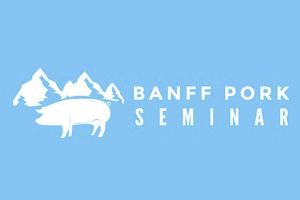
Numbers tell this story. There are more than 60 sponsors signed up for Banff Pork Seminar (BPS) 2020. Look around the meeting floor or the trade show and imagine that without the teams of staff and clients sponsors bring. Then look at your Seminar ticket and imagine paying about double that amount.
Those are two direct and huge benefits sponsors bring to each Seminar say BPS program co-chairs, Michael Dyck and Ruurd Zijlstra.
"The most direct benefit to all delegates is on the ticket, the fact that this support dramatically lowers the cost for each delegate attending this seminar," says Zijlstra. "We simply could not afford to have a conference of this scale otherwise."
"So much of the energy and networking comes from those sponsors and their connections," adds Dyck. "The hum of activity around the trade show, the fun times in the downtown pubs and restaurants each evening revolves around those client connections and everyone benefits from that.
"The 2020 sponsors are listed below in order of sponsorship category starting with the highest," says Dyck. "I'm sure we speak for all delegates in showing our appreciation for their support."
Sustaining Sponsors
- Alberta Pork
- Fast Genetics
- Hypor Genetics
- Maximus Systems
- PIC
- Swine Innovation Porc
- Topigs Norsvin
Premier Plus Sponsors
- AFNS, University of Alberta
- DuPont
- Maple Leaf Foods
- New Standard West Equipment Inc.
- Olymel
Premier
- Boehringer Ingelheim Animal Health
- Canadian Pork Council
- Kemin
- South West Ontario Veterinary Services
- Steve's Livestock Transport
Select Sponsors
- Agribution Canada Ltd.
- Alberta Animal Nutrition Lecture
- APC, Inc.
- Automated Production
- Barkman Concrete
- Biomin Canada Inc.
- Canadian Hog Journal
- Cargill Animal Nutrition
- Carlo Genetics Inc.
- Champion Alstoe Animal Health
- Delacon
- DNA Genetics
- DSM Nutritional Products
- EastGen / IMV Canada
- Farm Credit Canada
- Genesus Inc.
- Gestal by Jyga Technologies
- h@ms Marketing Services
- Hipra Animal Health
- Huvepharma
- Hylife Ltd.
- Innovative Heating Technologies Inc.
- Ketchum Manufacturing
- Manitoba Pork
- Marex Solutions
- Masterfeeds
- Merck Animal Health
- MicroSintesis Inc.
- Minitube Canada
- Modern Veterinary Therapeutics
- Neogen
- Ontario Pork
- Prairie Hog Country
- Protekta Inc.
- Ro-Main
- Schippers Canada Ltd.
- SEC Repro Inc.
- SKOV A/S
- Sunterra Farms
- VIDO-InterVac
- Walbern Agri-Systems (1991) Ltd.
- Zoetis Canada Inc.
Supporting Sponsors
- Alberta Barley
- AQINAC/Le Porc Show
- Canadian Bio-Systems
- Jefo Nutrition
- Nutrition Partners Inc.
- Warman Veterinary Services
Banff Pork Seminar's 2020 team brings energy, new thinking
Date posted: November 5, 2019
Many lessons from the sports world find their way into the arena of business and organizations. Teamwork is one of the strongest examples.
The Banff Pork Seminar (BPS) has built a reputation for excellence because it draws its leadership team from across the industry and across the nation.
BPS 2020 got its energy and new thinking from the group of people listed below assembled from industry, government and academia to serve on this year's Advisory Committee.
- Chair: Amy Cronin, Cronin Farms, Bluevale, Ont.
- Program co-chairs: Michael Dyck and Ruurd Zijlstra, University of Alberta, Edmonton, Alta.
- Conference coordinator: Ashley Steeple, University of Alberta, Edmonton, Alta.
- Javier Bahamon, Alberta Pork, Edmonton, Alta.
- Dan Bussières, Groupe Cérès Inc., Levis, Que.
- Cliff Ehr, Olymel, Humboldt, Sask.
- Dawn Friesen, Fast Genetics, Spiritwood, Sask.
- Daniel Godbout, PIC, St-Augustin, Que.
- Frank Novak, Sunhaven Farms, Sherwood Park, Alta.
- Darcy Pauls, Cargill, Niverville, Man.
- Bryan Possberg, Polar Pork Farms, Loreburn, Sask.
- Bill Rempel, Steve's Livestock Transport, Red Deer, Alta.
- Leigh Rosengren, Rosengren Epidemiology Consulting, Midale, Sask.
- Greg Simpson, Hypor, Burgessville, Ont.
- Ben Willing, University of Alberta, Edmonton, Alta.
- Jason Wood, Alberta Agriculture and Forestry, Edmonton, Alta.
BPS would like to remind everyone that the Advisory Committee is an open process. Anyone interested in serving on it or learning more about its role is invited to contact a current member.
Banff Pork Seminar 2020 welcomes media
Date posted: October 30, 2019
Each year a strong contingent of media show up to Banff Pork Seminar (BPS) to hear speakers on major issues in the pork industry.
"Their attendance at our Seminar reinforces the fact that our industry operates with transparency, confidence and real pride," says BPS chair, Amy Cronin. "There are few things as important to our industry as consumer and societal trust. That has been a key part of every BPS planning session for many years now.
"We are pleased that media attend and report the results of presentations. In fact, we encourage those that attend and those that follow up less directly to track down speakers for additional details.
"While most media will be from across North America they are interconnected with media around the world," says Cronin. "It's a reason Banff Pork Seminar continues to be a leading event globally."
Media are asked to register to attend BPS 2020. More details are on the BPS website www.banffpork.ca. at the "Inside BPS" Special Report link, under the "Media Assistance" button.
That Special Report includes the Inside BPS blog, feature articles and photos. These articles are available for media support and industry use.
Delegates can also help tell the story of pork by following BPS on social media. They can follow the Seminar @BanffPork on Twitter. And they can tweet frequently and with energy during and around the time of the 2020 Seminar using the hashtag #banffpork.
Joe Schwarcz talks "Sense, nonsense and science" at BPS 2020
Date posted: October 30, 2019
He's one of the most dynamic speakers on the world of science and society. The popular Joe Schwarcz will open Banff Pork Seminar (BPS) 2020 with his plenary presentation "Sense, nonsense and science."
Schwarcz is Director of McGill University's Office for Science and Society. He hosts a radio program on science and nonsense, authors a newspaper column on the subject and has been a frequent guest on television shows. He has received many awards for his work.
"Few people have the ability to bridge the world of science and discovery with the pressure of society to understand it," says Ruurd Zijlstra, University of Alberta scientist and BPS 2020 program co-chair. "Schwarcz has a lifetime of experience as a scientist himself and an interpreter of science.
"He does his presentations with energy, humor and common sense. There are always lessons for delegates to take home as a result."
Full program details and registration information is available at the Seminar website www.banffpork.ca. Follow on Twitter @banffpork. Connect on Facebook /BanffPork.
Wild ending planned for Banff Pork Seminar 2020
Date posted: October 30, 2019
It's one of the fastest growing problems around the world. Wild boars may be tasty subjects on the menu but they are a disastrous ecological force when they escape into the wild. They are amazingly adaptive, destroy habitat and create a disease threat.
Closing Seminary plenary speaker University of Saskatchewan research scientist Ryan Brook will take delegates on a wild finish to BPS 2020. Brook has spent his career studying wildlife including wildlife ecology and health, aboriginal engagement and traditional ecological knowledge, farmer knowledge about wildlife and managing the wildlife-livestock interface.
"He is engaged in an innovative research project that promises to shed light on the difficult-to-manage wild boar issue," says Dr. Michael Dyck, University of Alberta scientist and BPS program co-chair. "Our closing plenary session is a chance to end a busy few days on an informative and social note."
Full program details and registration information is available at the Seminar website www.banffpork.ca. Follow on Twitter @banffpork. Connect on Facebook /BanffPork.
Book now: BPS hotel rooms moving quickly
Date posted: October 30, 2019
Here's a news flash from Ashley Steeple at Banff Pork Seminar (BPS) 2020 headquarters. "Registrations for Banff Pork Seminar 2020 are flowing in at a steady rate but hotel rooms at the conference center Banff Springs Hotel are moving very briskly," says the Seminar coordinator.
"If anyone is considering registering and needs a hotel room, it is a good idea to book as soon as possible," she says. "The convenience and other benefits of staying at the Banff Springs are hard to beat.
Full program details and registration information is available at the Seminar website www.banffpork.ca. Follow on Twitter @banffpork. Connect on Facebook /BanffPork.
News Release: North America's pork industry meets at Banff Pork Seminar 2020
Date posted: October 22, 2019
It is simply the best place to be in the pork industry in North America. The 2020 Banff Pork Seminar (BPS) runs Jan. 7 to 9 at the beautiful Banff Springs Hotel in Banff Alta.
"The fact that this is our 49th Seminar underlines the value to the industry," says BPS program co-chair Dr. Ruurd Zijlstra of the University of Alberta. "This seminar has remained a leader because it always brings the best speakers together.
"It is also unparalleled opportunity for networking and fun. That's because the event has really grown into Banff Pork Seminar Week, with companies and organizations using this as a destination to bring staff and clients together for related business meetings."
The 2020 theme is "External forces, internal solutions" says BPS program co-chair Dr. Michael Dyck of the University of Alberta. "We face strong external forces," he says. "How we respond, how we develop internal industry solutions will define our success.
"The plenary speakers at BPS 2020 bring new, current perspective on the hard issues while a host of speakers in the Breakout Sessions provide clear thinking and implementable ideas on the practical side of the industry."
Here's a session snapshot. Tuesday's welcome reception eases into the week. Wednesday's Joe Schwarcz of McGill University tackles "Sense, nonsense and science." Then Tiffany Lee of the North American Meat Institute talks "The alternative protein movement: A challenge or unique opportunity."
Thursday, Brett Stuart of Global AgriTrends talks "Global markets and trends. And Klaus Depner of the Friedrich Loeffler Institute will outline "How much we need to know about African Swine Fever to be able to prevent, control and eradicate." Thursday's BPS 2020 closing plenary session looks at the thorny and growing issue of wild boars in Canada.
Breakout sessions topics include liability and the producer, nutrition, vaccines and health, sow management, pig resilience and smart technology. Wednesday's breakouts features an innovators' session; Thursday that time slot features a session on cross culture communications.
Full program details and registration information is available at the Seminar website www.banffpork.ca. Follow on Twitter @banffpork. Connect on Facebook /BanffPork. Get complete Seminar coverage in a Special Meeting Report via the link on the Seminar site.
Student science abstract deadlines Oct. 31, 2019
Date posted: October 22, 2020
There is more profile for successful young scientists in all industries in today's highly communicative world. The R. O. Ball Young Scientist Award presented at the Banff Pork Seminar (BPS) each year is an example that has proven popular with young scientists across the continent.
The award is named after Dr. Ron Ball, a long-time researcher and former BPS program director. It recognizes graduate and undergraduate students who provide a best overall combination of good and relevant science, a well-written abstract and an excellent presentation.
Deadline for abstracts for the 2020 Banff Pork Seminar student competition is October 31, 2019.
News Release: Entry deadline for Banff Pork Seminar Aherne Prize is Oct. 31, 2019
Date posted: October 22, 2019
North America's pork industry has grown through innovation. This is highlighted in the annual Banff Pork Seminar (BPS) awarding of the F.X. Aherne Prize for Innovative Pork Production.
Researcher Dr. Ben Willing of the University of Alberta, chairs the BPS awards selection committee. He says BPS is always impressed with the creativity and quality of entries for the Aherne Prize.
Named after the late Dr. Frank Aherne, a professor of swine nutrition and production at the University of Alberta, the contest is open to owners, production managers, herdspeople or consultants in, or anyone who has developed an innovation relevant to the North American pork industry.
"That can include original solutions to pork production challenges or creative uses for known technology," says Willing, "and past winners have included innovations both large and small, complex and simple. All segments of the pork industry qualify. That includes feeding, breeding, ventilation, disease control and prevention, transportation, manure management, animal handling, facility or enterprise management, and pork quality and safety.
The prize includes free 2020 BPS conference registration, accommodation at the world-renowned Fairmont Banff Springs Hotel and travel assistance for the Banff Pork Seminar Jan. 7 to 9, 2020 for up to two innovators. That's a value of approximately $2,000 each. Perhaps equally satisfying is the recognition of having innovations featured at this world-renowned pork industry conference, says Willing.
Best place to find all contest details are on the Seminar website www.banffpork.ca. Entry deadline for the upcoming 2020 BPS Prize is Oct. 31, 2019.
Follow Banff Pork Seminar on Twitter @banffpork. Connect on Facebook /BanffPork. Get complete coverage in a Special Meeting Report of the 2020 Banff Pork Seminar, presented by communications partner Meristem. Find the special report link on the Seminar site home page www.banffpork.ca.
Banff Pork Seminar 2020: The search for the leadership edge
Date posted: October 22, 2019
Welcome to Banff Pork Seminar (BPS) 2020.
Each year the Inside BPS Special Meeting Report is produced to take you "inside" the events and help you keep on top of developments. It's produced by Meristem editors in partnership with the Banff Pork Seminar (BPS) organizing committee.
The pork industry has brought an explosion of technology and techniques in recent years and the Banff Pork Seminar continues to be where the North American pork industry meets to find that leadership edge. Delegates will travel from across the continent and around the world launching the year with a search for knowledge, a hunger for networking and an opportunity for fun in this world renowned resort community and hotel.
The information in this Special Report – including blog items and news features – is designed to be available for use by media and industry, with credit to the source. These are a few key points.
The BPS hub. The best place to get everything you need to know about the 2020 Seminar, Jan. 7 to 9 is the Seminar website www.banffpork.ca. You can sign up for e-news advisories from Seminar coordinator, Ashley Steeple.
Inside BPS blog. These blog items will provide key information and perspective prior to, during and immediately following the 2020 seminar. Blog items are designed for use by media, industry communications specialists, producers and others in the industry. Simply provide a credit line to the Inside BPS Special Report and a live link to the Report.
News releases and news features. While these articles are primarily designed for media and industry communications specialists, they are available for anyone to use and are available for reprint. News releases can be used without requirement to provide credit. News features should be credited to the Banff Pork Seminar 2020 and linked to the Special Report.
Photos. Selected speaker photos are available for use. Credit Banff Pork Seminar.
Media assistance. As in past years, media assistance is available. You can find contact information and other key details under the "Media Assistance" link in the top right column of this Special Report web page.
Social media. Information and links to stories on BPS will also be featured on social media. Watch for regular updates under the #BanffPork hashtag. Follow the Banff Pork Seminar at Twitter handle @BanffPork and on the BPS Facebook Page. Follow Meristem at Twitter handle @NewStreamTweets.
Banff Pork Seminar organizers have worked hard to ensure each delegate's time in Banff is beneficial in a business sense and memorable on a personal level. Welcome to Banff Pork Seminar 2020.


